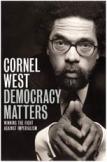America Needs Revival!
Cornel West’s Democracy Matters is a fervent, heartfelt and angry jeremiad about the current state of American society. Democracy, the author states at the outset, is being, or already has been snuffed out in America by three dominating tendencies: free market fundamentalism; militaristic interventionism and imperialism closely tied to racism; and escalating authoritarianism, illustrated particularly by John Ashcroft and the USA Patriot Act. These three tendencies are driven by three forms of political nihilism. The evangelical nihilists in the Bush administration are drunk with power, steeped in the conviction that might makes right. The paternalistic nihilists in the Democratic Party bring more devotion to social justice than the Republicans, but they have resolved that they can do more good by going along with the system than by questioning it. They have lost the high idealism of Franklin D. Roosevelt and Lyndon Johnson. The third nihilism is the sentimental nihilism of the media, which replaces critical newsgathering with something that looks like news but is really entertainment and the selling of the ideas of the elites.
Religion has a place in politics, says West, but even Christianity has been captured by forces of nihilism. Right-wing fundamentalism has drowned out the prophetic that comes from a true understanding of Jesus’s role in the spiritual as well as secular realm. The result of all these destructive tendencies is that the country is in crisis and despair.
But there is a deep democratic tradition that can be revived. The individualistic strain from Emerson to James Baldwin, the anti-imperialistic/anti-racist strain that runs from Melville to Toni Morrison, the prophetic Christianity exemplified by Martin Luther King Jr. and, he adds later in the book, the sense of the tragic in the blues tradition. We must, anew, be active in Putting on Our Democratic Armor, which is the title of West’s final chapter. Almost all his examples are literary, so he does not mention such social critics as the gentle Jane Addams or the fiery Eugene Debs.
West, who teaches at Princeton University, also has a chapter on the Israel-Palestine conflict, wherein he asserts that moderate elements have been silenced by extremists like Ariel Sharon and Yasir Arafat. He says the Jewish-controlled press and the American Israeli Public Affairs Committee (AIPAC), though not a conspiracy, help make the U.S. public uncritical of the Israeli occupation of Arab territories and discriminatory legislation within Israel. But as in the United States, he hopes that the prophetic elements in Israel and Palestine can reassert themselves.
Had I been glancing at this book while leaning against a shelf in a bookstore, I would have given it five or ten minutes and then put it back on the shelf. As a conscientious reviewer, however, I read every word, no matter how clichéd, every thought, no matter how platitudinous. The fact that I agree with West’s general political stance does not make me more tolerant of his sloppy thinking (the robber barons were, after all, also individualists), ill-defined terms (why is the press described as sentimental nihilists?), oversimplification and frequent outright banality. Is there a 14-year-old anywhere who would be shocked to learn that the author of all men are created equal was a slaveholder? The standard left rhetoric is easily parodied (see John Le Carré’s Absolute Friends).
My first tendency was to review the book simply as a political rant, essentially against the Bush administration. It is that, but it is morean exhortation to get back to the essentials of our society, its prophetic core. Unfortunately this book will probably not help much. It will appeal only to a small cheering section of the already convinced, who will applaud all the stridency, all the Bush-bashing. A friend of mine, a southerner with a way with words, says about West in general, that he has more strut than substance. That is certainly true of this book.
This article also appeared in print, under the headline “America Needs Revival!,” in the November 8, 2004, issue.








